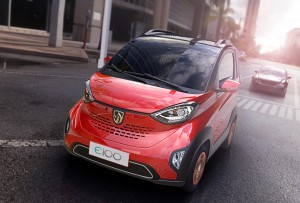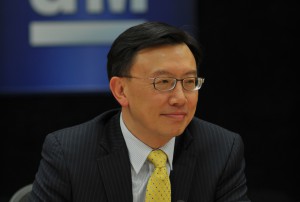
GM is counting on this Baojun E100 electric vehicle to help it meet China's EV production mandates by 2019.
Automakers around the globe are scurrying to try to meet China’s tougher-than-comfortable standards for NEVs, or New Energy Vehicles; however, General Motors isn’t sweating the deadline as it will make the time frame, the company says.
Matt Tsien, GM China’s president, said the company will make the 2019 production goals without having to buy NEV credits from other makers. The difficult 2019 quotas have many automakers hustling to make deals with China-based automakers to increase production of EVs.
GM’s deals with SAIC and Wuling, have the company on track to “at least meet, if not exceed, those credit mandate requirements.”
Chinese officials have been making noise about expanding EV production for the past few years, but early this year they started putting dates and deadlines on this “noise” — aggressive dates and deadlines, including the elimination of gasoline- and diesel-powered vehicles altogether by 2040.
When the numbers were initially revealed, it was GM CEO Mary Barra that registered an early set of concerns. “While we are exploring all channels to boost NEV sales, building raw consumer acceptance of NEVs will depend on continued joint effort between the government and automakers,” she said in September.
However, she said that GM would work with “the timetable of governments” on the mandates, but the goal would only be hit if the government played a role with consumers.
Barra noted the new mandates, combined with the government’s recent assertion that it may ban gasoline-powered cars altogether, did provide urgency for the automaker to develop a plan to introduce at least 10 new NEVs for the China market by 2020 and open a battery plant this year with domestic partner.
GM is doing well with its first vehicle, the Baojun E100, the microcar launched in July as part of a feasibility study of a direct-sale method GM devised for it and is currently available only in the south China city of Liuzhou where GM’s three-way joint venture produces them, Tsien noted.
The E100 is powered by a single motor that produces 110 Nm of torque and 29 kW of motoring power. It can travel up to 155 km on a single charge making it an excellent choice for many urban daily commutes in China. The lithium-ion battery pack can be fully charged in 7.5 hours.
In October, GM sold 1,724 E100s, and nearly 4,000 since its July deubt. The E100 starts at 93,900 yuan or $14,142, but with government subsidies it drops to about $5,400.
“Sales so far have largely met our expectations, perhaps even slightly above our expectations,” Tsien said. The car is one of the three electric battery car models GM already has available in China. GM plans to launch at least seven more NEVs in China by 2020.
GM isn’t alone in bolstering its EV resources in China. Ford, Volvo, Volkswagen and other automakers have recently announced plans to add new plants to build electric vehicles in the country.
China has set goals for electric and plug-in hybrid cars to make up at least a fifth of auto sales by 2025, as it combats air pollution and aims to close a competitive gap between newer domestic automakers and global rivals.

